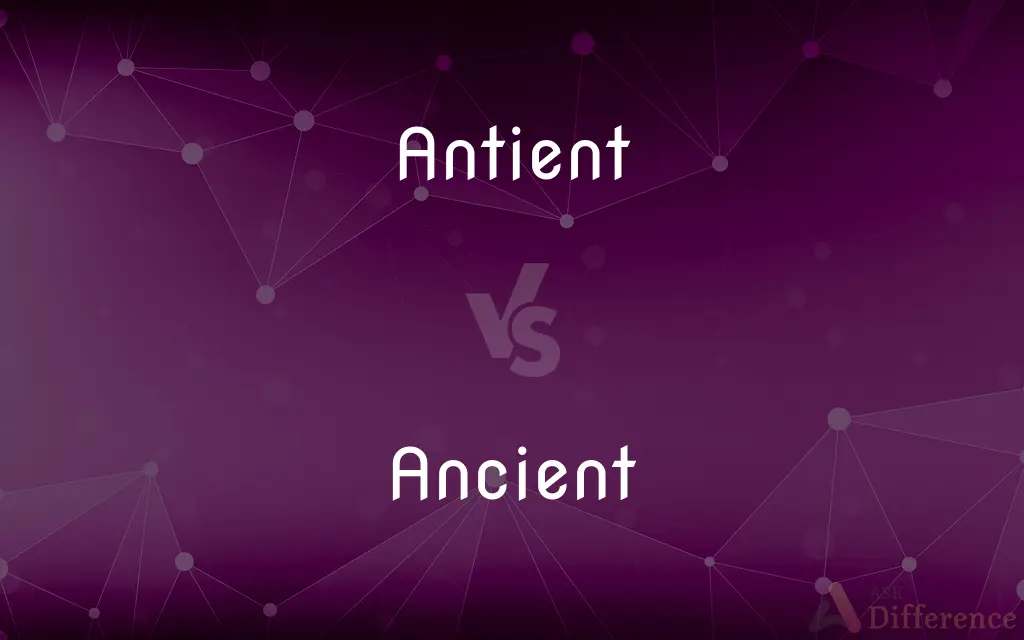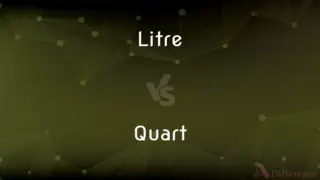Antient vs. Ancient — What's the Difference?

Difference Between Antient and Ancient
ADVERTISEMENT
Definitions
Antient
Obsolete spelling of ancient
Ancient
Belonging to the very distant past and no longer in existence
The ancient civilizations of the Mediterranean
Antient
Obsolete spelling of ancient
Ancient
An old man
A solitary ancient in a tweed jacket
Ancient
A standard, flag, or ensign.
ADVERTISEMENT
Ancient
Of, relating to, or belonging to times long past, especially before the fall of the Western Roman Empire (AD 476)
Ancient cultures.
Ancient
Of great age; very old
"The males live up to six months—positively ancient, for a bee" (Elizabeth Royte).
Ancient
(Archaic) Having the qualities associated with age, wisdom, or long use; venerable
"You seem a sober, ancient Gentleman by your habit" (Shakespeare).
Ancient
A very old person.
Ancient
A person who lived in times long past.
ADVERTISEMENT
Ancient
The peoples of the classical nations of antiquity.
Ancient
The ancient Greek and Roman authors.
Ancient
(Archaic) An ensign; a flag.
Ancient
(Obsolete) A flag-bearer or lieutenant.
Ancient
Having lasted from a remote period; having been of long duration; of great age, very old.
An ancient city
An ancient forest
Ancient
Existent or occurring in time long past, usually in remote ages; belonging to or associated with antiquity; old, as opposed to modern.
An ancient author
An ancient empire
Ancient
(history) Relating to antiquity as a primarily European historical period; the time before the Middle Ages.
Ancient
(obsolete) Experienced; versed.
Ancient
(obsolete) Former; sometime.
Ancient
A person who is very old.
Ancient
A person who lived in ancient times.
Ancient
One of the senior members of the Inns of Court or of Chancery.
Ancient
(obsolete) A senior; an elder; a predecessor.
Ancient
A flag, banner, standard or ensign.
Ancient
The bearer of a flag; ensign
Ancient
Old; that happened or existed in former times, usually at a great distance of time; belonging to times long past; specifically applied to the times before the fall of the Roman empire; - opposed to modern; as, ancient authors, literature, history; ancient days.
Witness those ancient empires of the earth.
Gildas Albanius . . . much ancienter than his namesake surnamed the Wise.
Ancient
Old; that has been of long duration; of long standing; of great age; as, an ancient forest; an ancient castle.
Remove not the ancient landmarks, which thy fathers have set.
An ancient man, strangely habited, asked for quarters.
Ancient
Known for a long time, or from early times; - opposed to recent or new; as, the ancient continent.
A friend, perhaps, or an ancient acquaintance.
Ancient
Dignified, like an aged man; magisterial; venerable.
He wrought but some few hours of the day, and then would he seem very grave and ancient.
Ancient
Experienced; versed.
Though [he] was the youngest brother, yet he was the most ancient in the business of the realm.
Ancient
Former; sometime.
They mourned their ancient leader lost.
Ancient
Those who lived in former ages, as opposed to the moderns.
Ancient
An aged man; a patriarch. Hence: A governor; a ruler; a person of influence.
The Lord will enter into judgment with the ancients of his people, and the princes thereof.
Ancient
A senior; an elder; a predecessor.
Junius and Andronicus . . . in Christianity . . . were his ancients.
Ancient
One of the senior members of the Inns of Court or of Chancery.
Ancient
An ensign or flag.
More dishonorable ragged than an old-faced ancient.
Ancient
The bearer of a flag; an ensign.
This is Othello's ancient, as I take it.
Ancient
Belonging to times long past especially of the historical period before the fall of the Western Roman Empire;
Ancient history
Ancient civilizations such as those of the Etruscans and Sumerians
Ancient Greece
Ancient
Very old;
An ancient mariner

















































